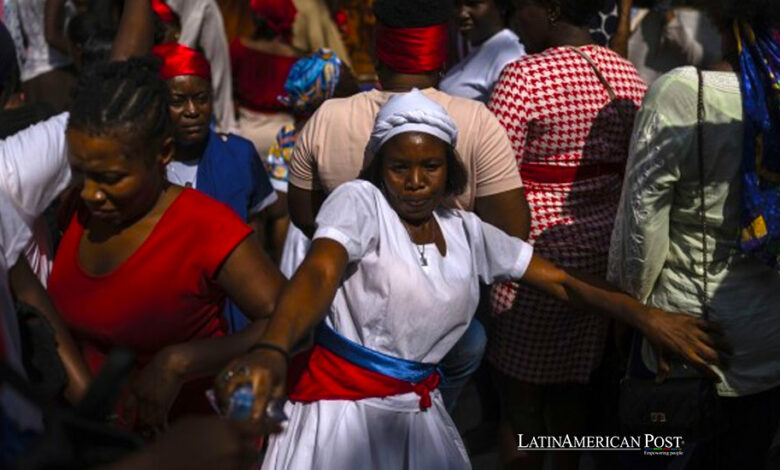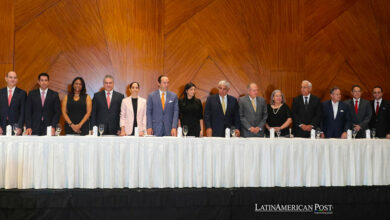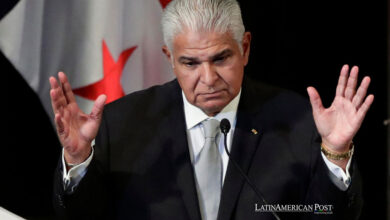Vodou’s Renaissance Amid Haitian Crisis

Amid escalating violence and political turmoil in Haiti, the global news organization AP reported that Vodou is experiencing a resurgence as a source of solace and resistance, with many Haitians turning to this ancestral faith for guidance and protection.
In the heart of Haiti, amidst the echoes of gunfire and the chaos of gang violence, a powerful scene unfolds. The faithful of Vodou gather, their voices rising in Haitian Creole against rhythmic drumbeats and the swig of rum. Their song is defiant: “We don’t care if they hate us because they can’t bury us.” This is not just a spiritual gathering; it’s a statement of resilience and a testament to the growing strength of Vodou in a country beset by crisis.
Resurgence Amidst Crisis
Vodou, once shunned by Haiti’s elites and intellectuals and associated with superstition and secrecy, is now stepping into a new dawn of acceptance and open practice. As the country grapples with unprecedented levels of violence that have left over 360,000 people homeless and the nation on the brink of famine, Vodou is transforming from a misunderstood religion to a crucial element of Haitian identity and survival.
The resurgence of Vodou can be traced back to its deep roots in the Haitian people’s struggle and resilience. Originating from the religious practices of enslaved West Africans, Vodou was pivotal in the 1804 revolution that led Haiti to become the world’s first free Black republic. Despite its significant role in Haitian independence, Vodou faced centuries of oppression during and after colonial rule.
For decades, the Catholic Church and the Haitian government stigmatized the practice of Vodou. In 1941, the Catholic Church demanded that parishioners renounce Vodou, and in the decades that followed, thousands of Vodou practitioners were persecuted. However, the faith endured, becoming a symbol of resistance and a keeper of Haitian culture and history.
Political Manipulation and Integration
The political landscape of Haiti provided further opportunities for the politicization of Vodou. Notably, François Duvalier, president in 1957, used Vodou to consolidate power, appointing oungans—Vodou priests—as his representatives. This manipulation of religion during Duvalier’s dictatorship paradoxically helped to integrate Vodou more into public life, even as it reinforced some of the negative stereotypes associated with it.
It was not until 2003 that a significant shift occurred when Jean-Bertrand Aristide, a former priest and Haiti’s first democratically elected president, officially recognized Vodou as one of the nation’s religions. This formal recognition marked a turning point, allowing Vodou to be practiced more openly and with greater acceptance, though it did little to alleviate the stigma faced by its adherents.
Today, as Haiti faces a severe security crisis, with increasing gang violence and a lack of effective governance, more Haitians are finding solace in Vodou. They turn to oungans and mambos (Vodou priestesses) for protection, healing, and guidance. Temples that once served a handful of families now welcome thousands of followers from Haiti and the Haitian diaspora.
The ceremonies and rituals of Vodou serve as a conduit for communication with the law (spirits), who play a crucial role in Vodou’s belief. These spirits are called upon in elaborate ceremonies involving music, dance, and offerings, which range from food items to elaborate feasts. The lwa are believed to offer protection and guidance, intervening directly in the lives of their devotees. In times of crisis, this spiritual support is invaluable, providing psychological comfort and a sense of empowerment and agency.
Evolving Traditions and Collective Well-being
As Vodou continues to grow, it also evolves. The religion’s visibility has increased, attracting intellectuals and younger generations to explore Vodou as a religion and a cultural heritage that offers a powerful counter-narrative to their current struggles. Vodou’s emphasis on community and collective well-being resonates strongly in today’s Haiti, offering a model for rebuilding and reimagining a society fraught with division and suffering.
Also read: Haiti’s Hunger Crisis: Driving Children to Armed Groups
In this renaissance, Vodou is more than a religion; it is a revolution in thought and practice, a rallying point for a nation in turmoil. It champions the idea that the Haitian people have a reservoir of strength and resilience rooted in their spiritual traditions despite the overwhelming challenges. As Haiti navigates through its compounded crises, Vodou stands as a beacon of hope and a testament to the enduring spirit of its people, promising a pathway not just to survival but to a spiritual and cultural revival.




